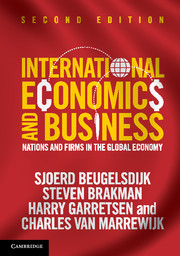Book contents
- Frontmatter
- Contents
- List of figures
- List of tables
- List of boxes
- Preface
- Part I Introduction
- Part II Firms, trade, and location
- Part III Capital, currency, and crises
- 8 Exchange rates
- 9 Currency crises and exchange rate policy
- 10 Gains from international capital mobility
- 11 Financial crises, firms, and the open economy
- 12 The Great Recession
- Part IV Consequences of globalization
- Bibliography
- Author index
- Subject index
10 - Gains from international capital mobility
from Part III - Capital, currency, and crises
- Frontmatter
- Contents
- List of figures
- List of tables
- List of boxes
- Preface
- Part I Introduction
- Part II Firms, trade, and location
- Part III Capital, currency, and crises
- 8 Exchange rates
- 9 Currency crises and exchange rate policy
- 10 Gains from international capital mobility
- 11 Financial crises, firms, and the open economy
- 12 The Great Recession
- Part IV Consequences of globalization
- Bibliography
- Author index
- Subject index
Summary
Keywords
Capital market integration • International allocation • Firm investment • Benefits of integration • Savings and investment • Institutions • Moral hazard • Measuring integration • Risk-spreading • Asymmetric information • Adverse selection
Introduction
In Chapter 2 we discussed several stylized facts about international capital mobility and integration. In Chapter 8 we introduced exchange rates, and in Chapter 9 we dealt with sudden exchange rate movements causing currency crises. Chapter 9 discussed two possible drawbacks of international capital mobility, namely the possibility of currency crises and the related observation that international capital mobility can reduce the degrees of freedom for policy-makers (the policy trilemma). In Chapters 11 and 12 we continue our analyses of the links between international capital mobility and financial crises (of which currency crises are often an integral part). But before doing so we discuss the potential gains from international capital market integration in this chapter. After reading Chapter 8, and especially Chapter 9, the wrong impression might gain hold that international capital mobility only has costs. This would be rather one-sided and if it were true why should countries bother to engage in international capital mobility? In discussing the benefits of capital market integration, we restrict ourselves to the two main benefits of capital market integration:
The first concerns the possibility that international capital flows channel national savings to their most productive investment opportunities, irrespective of the location of these opportunities.
The second is that international capital mobility permits an improved allocation of investment risk.
- Type
- Chapter
- Information
- International Economics and BusinessNations and Firms in the Global Economy, pp. 282 - 310Publisher: Cambridge University PressPrint publication year: 2013



